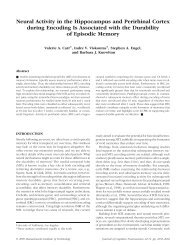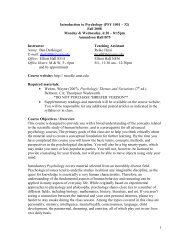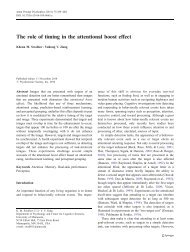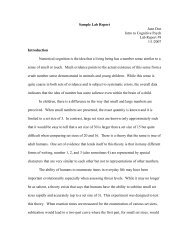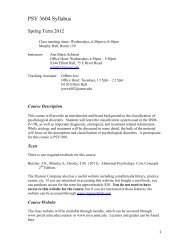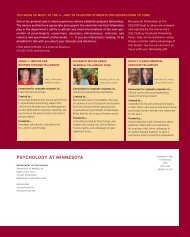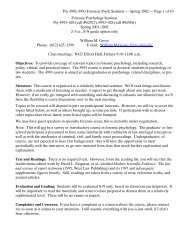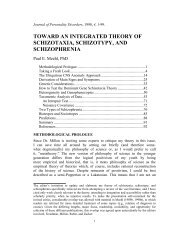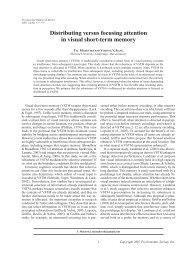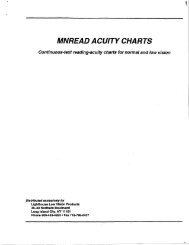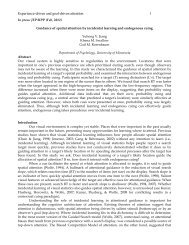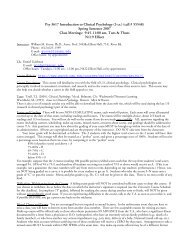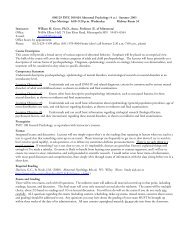PSY 3051: Introduction to Cognitive Psychology - University of ...
PSY 3051: Introduction to Cognitive Psychology - University of ...
PSY 3051: Introduction to Cognitive Psychology - University of ...
You also want an ePaper? Increase the reach of your titles
YUMPU automatically turns print PDFs into web optimized ePapers that Google loves.
What, when, & whereInstruc<strong>to</strong>r<strong>PSY</strong> <strong>3051</strong>: <strong>Introduction</strong> <strong>to</strong> <strong>Cognitive</strong> <strong>Psychology</strong>Section 001 LECFall 2011<strong>University</strong> <strong>of</strong> Minnesota, Twin CitiesInstruc<strong>to</strong>r: Pr<strong>of</strong>. Yuhong Vanessa JiangCourse number: <strong>Psychology</strong> <strong>3051</strong>: <strong>Introduction</strong> <strong>to</strong> <strong>Cognitive</strong> <strong>Psychology</strong>When: Fall 2011, Tu & Th 9:45am-11:00am (09/06-12/14)Where:Smith Hall Room 100, on East BankPrerequisite: <strong>PSY</strong> 1001: Intro Psych, or its AP equivalentCredit:3 credits (9hr/wk)Pr<strong>of</strong>essor:Office:Email:Office hours:Course web site:Yuhong V. Jiang, Associate Pr<strong>of</strong>essor <strong>of</strong> <strong>Psychology</strong>Elliott Hall S251cogpsych.jiang@gmail.com;immediately after most classes, or by appointmenthttps://moodle.umn.eduTeaching assistantsAngela Qin: Office hours: Tue 12-1 PM Loc: S515 Elliott HallBo-Yeong Won: Office hours: Mon 5-6 PM Loc: S506 Elliott HallContact with the teaching staffEmail (cogpsych.jiang@gmail.com), specify the individual you wish <strong>to</strong> communicate with inthe title <strong>of</strong> the message (e.g., For TAs: Midterm1 question)Course descriptionWelcome! This course provides an overview <strong>of</strong> the theoretical and empirical approaches thatconstitute <strong>Cognitive</strong> <strong>Psychology</strong>. <strong>Cognitive</strong> psychologists explore the nature <strong>of</strong> cognitiveprocesses such as attention, memory, concept, reasoning, perception, emotion, and language.Our goals for this course are <strong>to</strong> understand how the mind works and how the brain works <strong>to</strong>produce such a mind. Trying <strong>to</strong> understand our own minds is one <strong>of</strong> the most ambitious andexciting projects in all sciences. This course will introduce you <strong>to</strong> major <strong>to</strong>ols, assumptions,and theories <strong>of</strong> cognitive psychology, and expose you <strong>to</strong> some <strong>of</strong> the more important resultsobtained thus far.Expected work1. (68%) Three examsFall 2011 <strong>PSY</strong> <strong>3051</strong> at umn.edu1Intro <strong>to</strong> <strong>Cognitive</strong> <strong>Psychology</strong>
Midterm 1 (16%) will be administered in-class on Thursday, Oc<strong>to</strong>ber 20, which will test yourknowledge <strong>of</strong> materials covered from Sep 7 th <strong>to</strong> Oct 18 th . Midterm 2 (16%) will beadministered in-class on Tuesday, November 22, which will test your knowledge <strong>of</strong> materialscovered from Oct 25 th <strong>to</strong> November 17 th . The final exam (36%) will be administered in-class onThursday, December 22 from 8-10am and will cover materials from the entire course. Makeupexams will not be granted except with signed verification from the Office for StudentAffairs with legitimate excuse. You should not register in this course if you will be unavailablefor the exam dates listed above.2. (12%) Three lab reportsWe will conduct in-class labs three times during the semester. You will divide in<strong>to</strong> subgroups<strong>of</strong> 3 <strong>to</strong> conduct classical cognitive experiments. Data from the class will be averaged for you <strong>to</strong>write a lab report. This will be short description <strong>of</strong> what you have found and what you think itmeans (word limit: 500 words, inclusive <strong>of</strong> all text). Lab reports are due at 9:45am one-weekafter the lab session. Each lab report will be graded on a 10-point scale and counts 4% <strong>to</strong>wardyour final grade. Late submission will cost 1-point (out <strong>of</strong> the 10) per day.3. (20%) 22 Quiz and 4 attendanceWe will take class attendance four times: the first class and each <strong>of</strong> the 3 labs. In addition, therewill be one quiz for each <strong>of</strong> the other 22 lectures, which must be submitted in that lecture’sclass. Each attendance or each correct response <strong>to</strong> a quiz will give you 1%, for a maximum <strong>of</strong>20%. Perfect record (all 4 attendance and all 22 correct answers <strong>to</strong> the quiz) will earn you anextra 2% bonus <strong>to</strong>ward your final score.TextbookLectures will be drawn from a wide array <strong>of</strong> materials, and consequently they do not significantlyoverlap with any existing textbooks. However, readings will be assigned from chapters in thefollowing textbook:Reisberg, Daniel (2009). Cognition: Exploring the science <strong>of</strong> the mind. (4 th edition). Note: 2 nd and 3 rdeditions are acceptable.In addition, for each class we will assign a related journal article for you <strong>to</strong> read. Readings are linked<strong>to</strong> this syllabus! Exam materials may be drawn from the journal articles.Additional readingsSupplementary readings will be drawn from the scientific literature and linked <strong>to</strong> the course web site.The following book is a good reference for brain-related materials:Gazzaniga, M.S., Ivry R.B., Mangun G.R. (2008). Cognition Neuroscience: The Biology <strong>of</strong> the Mind(3 rd edition; GIM). [2 nd edition is informative <strong>to</strong>o].Both the Reisberg book and the GIM can be purchased at from the web. Used copies and older editionsare acceptable.Preliminary course outlinesFall 2011 <strong>PSY</strong> <strong>3051</strong> at umn.edu2Intro <strong>to</strong> <strong>Cognitive</strong> <strong>Psychology</strong>
Here is a preliminary outline <strong>of</strong> the materials that we will cover in this course. The exact timing <strong>of</strong> thelectures is subject <strong>to</strong> change: we may end up spending more time than is listed here on <strong>to</strong>pics thatstrike you as especially interesting or difficult.Date Day Quiz Topic Readings9/6 Tu attendance <strong>Introduction</strong> 1: <strong>Cognitive</strong><strong>Psychology</strong>Potter (1975). Meaning in visualsearch; Reisberg Chapter 1.9/8 Th Q1 <strong>Introduction</strong> II: Themes Bloom (2001): Word learning9/13 Tu Q2 Attention 1: Consequence <strong>of</strong>attentionLavie (2005). Selective attentionunder load. Reisberg Chapter 4.9/15 Th Q3 Attention 2: Object-based attention Scholl (2001): Objects & attention9/20 Tu attendance Lab 1: Visual search Report due: 9/27 at 9:45am9/22 Th Q4 Attention 3: Visual search(provides background for Lab 1)Wolfe (1998). 1,000,000 trials <strong>of</strong>visual search.9/27 Tu Q5 Attention 4: Divided attention Pashler et al. (2001). Attention andperformance.9/29 Th Q6 Memory 1: Amnesia, memory bytimeLuck & Vogel (1997). Capacity <strong>of</strong>visual working memory. ReisbergChapter 5.10/4 Tu attendance Lab 2: Serial position curve Report due: 10/11 at 9:45am10/6 Th Q7 Memory 2: Amnesia, memory bytypeNYTimes (08): HM’s Obituary.Reisberg Chapter 6.10/11 Tu Q8 Memory 3: Declarative memory Karpicke & Roediger (08).Retrieval for learning. ReisbergChapter 7.10/13 Th Q9 Memory 4: Memory asreconstructionL<strong>of</strong>tus (03): make-believememories. Reisberg Chapter 8.10/18 Tu Q10 Emotion & Cognition Susskind & Anderson (2008).Facial expression form & function.10/20 Th Midterm Exam 110/25 Tu Q11 Knowledge 1: Concept &CategorizationLombrozo (2009). Explanation andcategorization. Reisberg Chapter 9.10/27 Th Q12 Knowledge 2: Number Feigenson (04): Number system.11/1 Tu Q13 Knowledge 3: Reasoning & Reisberg Chapters 12, 13, 14.Decision11/3 Th Q14 Knowledge 4: Theory <strong>of</strong> Mind 1: Saxe (04): Reading your mindBasics11/8 Tu Q15 Vision 1: <strong>Introduction</strong> Reisberg Chapter 3.11/10 Th attendance Lab 3: Face perception Report due 11/17 at 9:45am11/15 Tu Q16 Vision 2: Face perception Moscovitch et al. (1997). What isspecial about face recognition?11/17 Th Q17 Vision 3: What, where, and how Goodale (04): duplex vision11/22 Tu Midterm Exam 211/24 Th Thanksgiving, no class11/29 Tu Q18 Research Methods Kosslyn et al. (2003). Mentalimagery. Reisberg Chapter 2.12/1 Th Q19 Language 1: Language acquisition Johnson & Newport (1989).Critical period in L2 learning.Fall 2011 <strong>PSY</strong> <strong>3051</strong> at umn.edu3Intro <strong>to</strong> <strong>Cognitive</strong> <strong>Psychology</strong>
12/6 Tu Q20 Language 2: Language & the brain Hickok (02): Sign language inbrain. Reisberg Chapter 10.12/8 Th Q21 Language 3: Language & thought Dehaene (06): Core knowledge <strong>of</strong>geometry in an Amazonian group12/13 Tu Q22 Finale: Consciousness & Wrap-up Tong et al. (1998). Binocularrivalry & visual awareness.Reisberg Chapter 15.12/22 Final Exam (in our classroom) 8-10am. A Q&Areview section will be arranged.Have a good winter break!Policies1. Make-up exam policyThere are no makeup exams. In case <strong>of</strong> signed verification from the dean’s <strong>of</strong>fice withlegitimate excuse for a missed exam, see Instruc<strong>to</strong>r.2. Score dispute policyDispute about grading on an exam or lab report should be brought <strong>to</strong> Pr<strong>of</strong>. Jiang, rather than <strong>to</strong>any <strong>of</strong> the TAs. Your entire exam or lab report will be re-graded, including parts where you donot have disputes. The corrected score could be lower than the original you received, becauseyou may lose points on some questions that gain points on others.3. Materials responsibleLecture materials, plus readings that overlap with lecture materials. Exams questions are drawnfrom lecture materials.4. Lab report gradingEach lab report will be graded on a 10-point scale. Lab report turned in after the deadline, evenif passed, will not receive the maximum. Each late day means 1-point lower in the maximum.Each exceptionally good lab report may earn a bonus <strong>of</strong> 1-point.5. Communication policyStudents are encouraged <strong>to</strong> discuss among themselves the results and interpretation <strong>of</strong> labresults during the in-class lab. However, once the class is dismissed, students should NOTdiscuss lab reports with other students. Each person must independently work on the labreports. You can consult with the TAs or the instruc<strong>to</strong>r, but not with other students. Do notcopy or paraphrase other students’ lab reports.6. AttendanceAttendance on the first day <strong>of</strong> class and on each <strong>of</strong> the three labs is manda<strong>to</strong>ry. Those who donot show up on the first day <strong>of</strong> class may forfeit their seat <strong>to</strong> other students waiting <strong>to</strong> registerfor the class. In-class quizzes will be given on days when attendance is not taken. Exams willbe based on lecture materials. In previous years, students who missed lectures tended <strong>to</strong> dopoorly on exams.7. Grades *Final exam: 36%; midterm 1: 16%; midterm 2: 16%; three lab reports: 12% (each 4%); Quizand attendance: 20%.Fall 2011 <strong>PSY</strong> <strong>3051</strong> at umn.edu4Intro <strong>to</strong> <strong>Cognitive</strong> <strong>Psychology</strong>
We will not normalize (or, “curve”) the grades across the 100+ students. Final grades will begiven based a fixed criterion:88+ is A; 84+ is A-; 80+ is B+; 75+ is B; 70+ is B-; 65+ is C+; 60+ is C; 55+ is C-; 50+ is D;50- is F. For SAT/UNSAT grades: SAT must be 55+.8. Lab reports contentLab reports should include: (1) Results: Describe the results in common English. For example,you might say “accuracy in condition 1 is higher than in condition 2: mean for condition 1 is95% and for condition 2 is 60%”. There is no need <strong>to</strong> provide statistical analysis. (2)Discussion: Discuss what the results mean and their theoretical implications. The entire labreport should not exceed 500 words, including all text (title, main text, footnote, figure or tablecaption).9. MisconductAcademic dishonesty in any portion <strong>of</strong> the academic work for this course shall be grounds forawarding a grade <strong>of</strong> F or N for the entire course. For more information about student conductand integrity, see http://www.d.umn.edu/assl/conduct/integrity/student.html.10. MiscellaneousStudents are responsible for all information disseminated in class and all course requirements,including deadlines and examinations. A student is not permitted <strong>to</strong> submit extra work in anattempt <strong>to</strong> raise his or her grade, including REP points. Students with disabilities that affecttheir ability <strong>to</strong> participate fully in class are encouraged <strong>to</strong> bring this <strong>to</strong> the attention <strong>of</strong> theinstruc<strong>to</strong>r so that appropriate accommodations can be arranged. Further information is availablefrom Disabilities Services.* The <strong>of</strong>ficial <strong>University</strong> grading standards are as follows: A: achievement that is outstanding relative <strong>to</strong> the level necessary <strong>to</strong> meetcourse requirements; B: achievement that is significantly above the level necessary <strong>to</strong> meet course requirements; C: achievement thatmeets the course requirements in every respect; D: achievement that is worthy <strong>of</strong> credit even though it fails <strong>to</strong> meet fully the courserequirements; S: achievement that is satisfac<strong>to</strong>ry, which is equivalent <strong>to</strong> a C- or better; F (or N): represents failure (or no credit) andsignifies that the work was either (1) completed but at a level <strong>of</strong> achievement that is not worthy <strong>of</strong> credit or (2) was not completed andthere was no agreement between the instruc<strong>to</strong>r and the student that the student would be awarded an I; I (incomplete): assigned at thediscretion <strong>of</strong> the instruc<strong>to</strong>r when, due <strong>to</strong> extraordinary circumstances, e.g., hospitalization, a student is prevented from completing thework <strong>of</strong> the course on time; requires a written agreement between instruc<strong>to</strong>r and student.Fall 2011 <strong>PSY</strong> <strong>3051</strong> at umn.edu5Intro <strong>to</strong> <strong>Cognitive</strong> <strong>Psychology</strong>



